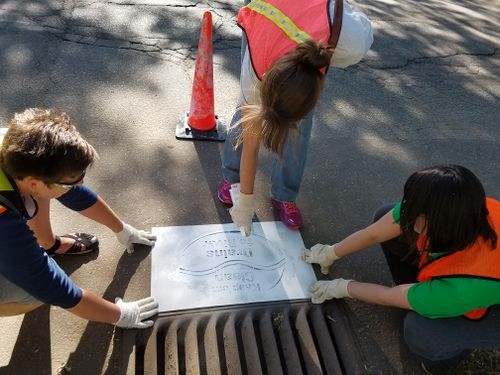
Difference between revisions of "MCM 2 Public Participation/Involvement"
| Line 1: | Line 1: | ||
| − | [[File:StormwaterStenciling.jpeg|500 px|right| | + | [[File:StormwaterStenciling.jpeg|500 px|right|alt=image showing residents stenciling storm drains]] |
| + | ==Introduction== | ||
Protecting stormwater cannot be completed by one person alone, but will be the result of communities engaging their residents, businesses, and industries to become invested in water quality. Minimum Control Measure (MCM) 2 of the [https://stormwater.pca.state.mn.us/index.php?title=MS4_PART_III.STORMWATER_POLLUTION_PREVENTION_PROGRAM_(SWPPP) MS4 General Permit] requires permittees to find methods to motivate their communities into action through opportunities, programs, or other approaches to prevent stormwater pollution. Common examples seen around Minnesota include storm drain stenciling activities, drain adoption programs, and volunteer monitoring programs. | Protecting stormwater cannot be completed by one person alone, but will be the result of communities engaging their residents, businesses, and industries to become invested in water quality. Minimum Control Measure (MCM) 2 of the [https://stormwater.pca.state.mn.us/index.php?title=MS4_PART_III.STORMWATER_POLLUTION_PREVENTION_PROGRAM_(SWPPP) MS4 General Permit] requires permittees to find methods to motivate their communities into action through opportunities, programs, or other approaches to prevent stormwater pollution. Common examples seen around Minnesota include storm drain stenciling activities, drain adoption programs, and volunteer monitoring programs. | ||
| + | ==Requirements== | ||
To keep their communities in the loop, permittees must: | To keep their communities in the loop, permittees must: | ||
:*Provide at least one opportunity for the public to provide input on the stormwater pollution prevention program (SWPPP). | :*Provide at least one opportunity for the public to provide input on the stormwater pollution prevention program (SWPPP). | ||
| Line 8: | Line 10: | ||
:*Document activities, as described [https://stormwater.pca.state.mn.us/index.php?title=Documentation_requirements_and_documents_to_retain_under_the_MS4_permit here]. | :*Document activities, as described [https://stormwater.pca.state.mn.us/index.php?title=Documentation_requirements_and_documents_to_retain_under_the_MS4_permit here]. | ||
| − | Additional resources | + | ==Additional resources== |
*[https://www.epa.gov/npdes/national-menu-best-management-practices-bmps-stormwater#inv EPA MCM 2 guidance] - EPA's guidance and suggested BMPs for an effective public involvement program | *[https://www.epa.gov/npdes/national-menu-best-management-practices-bmps-stormwater#inv EPA MCM 2 guidance] - EPA's guidance and suggested BMPs for an effective public involvement program | ||
*[https://www.epa.gov/soakuptherain EPA's Soak Up the Rain Campaign] - Provides template and customizable outreach tools and resources to educate and engage your community on the impacts of stormwater pollution and how to help solve the problem | *[https://www.epa.gov/soakuptherain EPA's Soak Up the Rain Campaign] - Provides template and customizable outreach tools and resources to educate and engage your community on the impacts of stormwater pollution and how to help solve the problem | ||
Revision as of 17:16, 4 January 2018
Introduction
Protecting stormwater cannot be completed by one person alone, but will be the result of communities engaging their residents, businesses, and industries to become invested in water quality. Minimum Control Measure (MCM) 2 of the MS4 General Permit requires permittees to find methods to motivate their communities into action through opportunities, programs, or other approaches to prevent stormwater pollution. Common examples seen around Minnesota include storm drain stenciling activities, drain adoption programs, and volunteer monitoring programs.
Requirements
To keep their communities in the loop, permittees must:
- Provide at least one opportunity for the public to provide input on the stormwater pollution prevention program (SWPPP).
- Provide access to the public to view the SWPPP document, Annual Reports, and other documentation related to the SWPPP.
- Consider public input.
- Document activities, as described here.
Additional resources
- EPA MCM 2 guidance - EPA's guidance and suggested BMPs for an effective public involvement program
- EPA's Soak Up the Rain Campaign - Provides template and customizable outreach tools and resources to educate and engage your community on the impacts of stormwater pollution and how to help solve the problem
